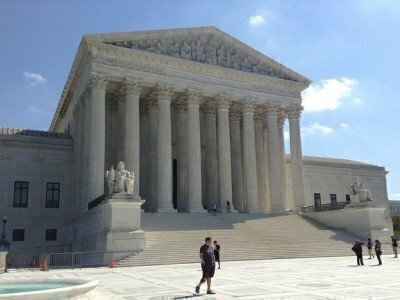The national spotlight has recently focused on civil asset forfeiture; a practice that allows law enforcement officials to seize property that they suspect is involved with criminal activity. In 2008, the US Department of Justice’s Assets Forfeiture Fund had more than $1 billion in assets, and the seemingly widespread use of this tactic has come under scrutiny from both the left and the right. Perhaps the biggest concern of opponents to asset forfeiture is that the Supreme Court has ruled that even if an individual is eventually found to be not guilty, the government does not necessarily have to return the seized assets.
 Today, the Supreme Court will hear oral arguments in the case of Luis v. United States. While case does not directly challenge the constitutionality of asset forfeiture as a practice, it highlights how the restraint of personal assets of a criminal defendant could raise due process concerns.
Today, the Supreme Court will hear oral arguments in the case of Luis v. United States. While case does not directly challenge the constitutionality of asset forfeiture as a practice, it highlights how the restraint of personal assets of a criminal defendant could raise due process concerns.
Silva Luis was indicted for her role in a Medicare fraud scheme that involved her family’s healthcare business. In addition to pursuing those criminal charges, the government brought a civil action to freeze Luis’ assets, such that she could not access them before and during her criminal trial. Federal law grants courts the authority to restrain “property of equivalent value” of that associated with the alleged fraud - in this case amounting to over $45 million - which far exceeded Luis’ net worth. The government acknowledges that the funds they are freezing are not directly traceable to or involved with the alleged fraud, but asserts that it can freeze these untainted assets to ensure that when a judgment is rendered, the defendant will still have that money to pay damages.
Given that the freezing order is for an equivalent of $45 million, it applies to all of Luis’ assets. As a result of this, Luis could not afford to pay for a lawyer of her choosing, and is suing the government for alleged violations of her Fifth Amendment rights to due process and Sixth Amendment right to counsel.
In 2014, the Supreme Court explained in a 6-3 decision that the Fifth and Sixth amendments do not guarantee a defendant the right to use “ill-gotten gains”, or funds directly associated with an alleged crime, to pay for legal counsel. They clarified in that case that the determination of asset seizure can be made in the pre-trial phase, and denied defendants other procedural protections. Chief Justice John Roberts dissented in that case, and lamented that “few things could do more to undermine the criminal justice system’s integrity than to allow the government to initiate a prosecution and then, at its option, disarm its presumptively innocent opponent by depriving him of his counsel of choice”.
Briefs have been filed in support of Luis explaining that even under the current framework which allows pre-trial asset seizure in certain circumstances, Luis’ case is fundamentally different. Earlier cases dealt only with assets that could be directly linked to the crime, and in this case Luis’ lawyers assert that at least $4.5 million of the assets that the government froze were from legitimate sources of income.
Government lawyers have argued that the governmental interest in collecting a full recovery of fraud damages is compelling, and overrides any Sixth Amendment interests the defendant has. They assert that it doesn’t matter whether the assets were tainted or not, since the judge had found that there was probable cause to believe that Luis has spent some of the fraudulent funds on expensive, luxury items. Since it is possible that Luis would spend her untainted assets in the meantime and make a full recovery of damages impossible, they explain that this sort of practice is justified.
In Kaley, the 2014 decision dealing with the seizure of tainted funds, Chief Justice Roberts was joined in his dissent by Justices Breyer and Sotomayor. The interesting distribution of votes in that case hints that this issue may not divide the Justices on clear ideological lines, and gives lawyers for both sides insight into the issues and angles to focus on during oral arguments.







